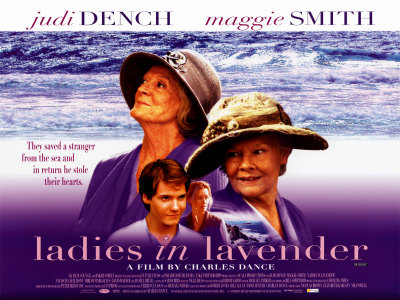
LADIES IN LAVENDER
UK, 2004, 108 minutes, Colour.
Judi Dench, Maggie Smith, Daniel Bruhl, Natascha Mc Elhone, Miriam Margoyles, David Warner, Freddie Jones.
Directed by Charles Dance.
Ladies in Lavender is set in the late 1930s and, in many ways, it could have been made at that time. Little surprise that it was the Royal Command Performance film for 2004.
Charles Dance, in his first writing and directing work, has adapted a novella about two older sisters living on the coast of Cornwall. He has been well served by his locations, the wild cliffs and beaches with both calm and pounding storms, and by the recreation of an English village of the times with its enclosed way of life. He has also been well served by his cast. The two sisters are played with the expected insight and intensity by Judi Dench and Maggie Smith. Daniel Bruehl (Goodbye Lenin, The Edukators) plays a mysterious young Pole who has been washed up on the beach and whom the sisters take care of, bringing out the maternal in them both, but rousing feelings in the sheltered spinster (Judi Dench) that she had never experienced. David Warner is the local doctor. Miriam Margolyes steals her scenes as the down-to-earth servant and Natascha Mc Elhone is the elegant painter visiting the village.
Daniel Bruehl is charming as the young man and soon has everyone, including the audience, under his spell. This is enhanced when it emerges that he is a talented violinist (his playing dubbed by Joshua Bell).
Realistically, it is all a bit implausible – his rescuers do not really try to find out who the stranger is or what his background is, although the doctor is not above suggesting he is a spy because he speaks German – and the ending is like a fairytale. But, for those who can suspend this disbelief and who appreciate the strong leading actresses, this excursion into lavender-land is pleasing old-fashioned (quite old-fashioned) entertainment.
1.The appeal of the film, old-fashioned style and content? Royal Command Performance film?
2.The British setting, Cornwall, the coast and the beaches, the town, 1936? Fashions, cars? Re-creation of the period?
3.The musical score, local music, the memories of World War One with “Flowers in Picardy”? The classics? Andrei playing, the final concert?
4.The title, the focus on the women, delicate and old-fashioned, for the 21st century?
5.The two sisters, walking along the beach, playfully, paddling, splashing? The bonds between the two? Their life at home, meals, sharing the room, sharing support? Maiden sisters? Janet and her memories of Peter, dying in World War One? Ursula and her never having been married? Enclosed, their rituals, listening to the radio, knitting, personal likes and dislikes, Arthur Askey? The car in the garage? Janet giving Andrei the haircut, Ursula taking the lock? Dorcas and their life, servant? Moneyed and genteel?
6.The storm, the calm of the day after? Finding Andrei, Ursula seeing him, Janet practical, carrying him on the stretcher, the room, Dr Mead’s visit? Their puzzle about his identity, Polish, his broken ankle? His recovering, eating, the few words?
7.The effect of finding Andrei on each of the women? Their age, his age? Experience and innocence? Ursula keeping vigil, bringing the meals, words written and put on their objects? Janet and the German dictionary, speaking German? Janet as practical, Ursula as romantic, staring at him, wanting to touch his hair? Being caught by Janet and Janet interrogating her – Ursula wanting an apology?
8.Andrei, not much background story given, his experience, learning, on the crutches, listening to Janet play the piano, the violin, his playing, his ability? Olga hearing him?
9.Andrei getting better, walking, going into the town, the fishermen, the harvest party, his playing, dancing, drinking – and arriving home noisy drunk? Olga meeting him, inviting him to her house, the talk about the letter she wrote, the sisters not telling him about her brother, playing, her doing the portrait of him, a platonic relationship?
10.Olga, her story, her brother, listening to the music, her painting, the sisters seeing her as a witch? Dr Mead and his advances, his comment on her painting, at the harvest festival, the telegram from her brother, taking Andrei away?
11.Dorcas, her style, practical and down-to-earth, jobs around the house, her ironic remarks, the shopping, at the market, getting the fish, getting orders from Janet, in the rain, Dr Mead’s car? Enjoying Andrei’s presence? Beating the carpet and his game? Listening to the concert – and it being her idea that the sisters go?
12.Dr Mead, his work, the loner? His advances towards Olga, jealousy, drinking? Going to the police and reporting that Andrei and Olga spoke German? His being at the concert at the end?
13.The men of the village, preparing the stretcher, the scenes of farming, harvesting, the pub and the games, Adam and his playing the violin in the house, at the dance, the old men, the young, the jealous young man attacking Andrei outside? Their all listening to the concert?
14.Andrei, the experience in Cornwall, his gratitude, the lyrical scenes of his stay with the sisters, swimming – and playing the trick on them by coming onto the beach as if dead? His going away, finally sending the portrait, the letter? The achievement of the concert?
15.The sequence of everybody in the town listening?
16.Janet and Ursula at the concert, the portrait, meeting Andrei, leaving – and letting go?
17.A film of old time values?